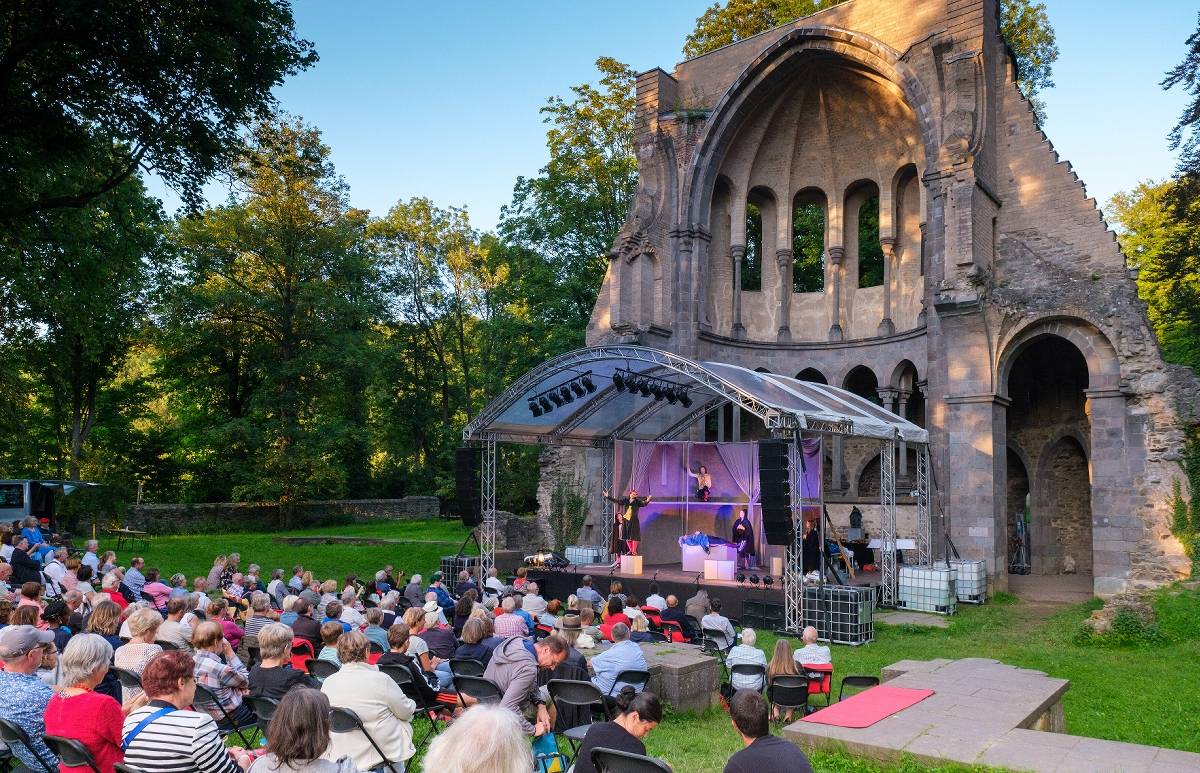Play in Königswinter with 350 guests Cologne theater stages Beethoven's life in front of the choir ruins Heisterbach
The Cologne NN theater shows the life of Ludwig van Beethoven at the choir ruin Heisterbach - each time in front of sold-out rows with 350 spectators.
Tatatataaa! Sold out! The NN-Theater Cologne had "full house" with its play "Beethoven - the wild breath of music" at both open-air performances in front of the romantic choir ruin of Heisterbach with 350 visitors each time. Ulrich Berres, cultural officer of the city of Königswinter: "This is a sign of appreciation both for the great composer Beethoven and for the NN stage, which has already made a name for itself here.“
The audience was enthusiastic about the play, euphorically acknowledging the performance of the actors and musicians with shouts of bravo at the end. The wait for the performance, which was actually on last year's schedule for the 250th anniversary of Beethoven's birth, had been worth it. The way in which author Thomas Köller and director Irene Schwarz brought the life of the great Bonn composer to life on the stage was entrancing. Characteristics of the composer and incidents surrounding him were illuminated in an original way and with humor.
The play is in the tradition of popular theater
"Beethoven, the rebel, the free spirit, the free artist - what is going on in this head?": Koller had asked himself this question. And accordingly has his play set in Beethoven's head on the day of his funeral, with scenes of his life emerging from his memory. Ingenious. The NN ensemble created a Beethoven "for everyone" on stage in the tradition of folk theater. With playfulness and imagination, the actors, Tom Simon, Aron Torka and Aischa-Lina Löbbert, devoted themselves to the life of this genius - exquisitely.
The setting for this "stage biography" was ideal, although sparse. A few white boxes could be stacked at will to form a coffin, a piano or, say, a carriage. And a scaffolding structure with a gallery and fabric scarves provided the actors with a second level, which they skillfully integrated into the action by means of a ladder.
Right at the beginning, the reporter stands at the top and reports on Beethoven's funeral procession. "Twenty thousand people are accompanying his coffin." He directs the viewer's attention to Franz Grillparzer, who says in his eulogy, "Life's thorns had wounded him deeply." And Beethoven tells how he was "cannibalized" in the last 193 years. "Twice I was dug up again. Doctors chopped up my head. They wanted to know where in my head the genius was. I know here in my rebel heart, in it lives a ‚Nevertheless‘ - to faith, to life, to love." And: "A curl was recently auctioned for 17,000 Euro.“
Beethoven, the little Bonner, who had to practice before daylight and dew fall. "Quiet, we have to get up early," shouts the baker's neighbor - Beethoven's father is once again late from the pub. And scolds: "Ludwig, Ludwig, get up, that good-for-nothing brat." And what is he playing again? "Always the useless stuff.“
Insights into the life of the musician
At 17, to Mozart on a study trip, back to Bonn, death of his mother. His lament: "I'm as sick of Bonn as one can get." Beethoven sits in the carriage, arrives at the Naschmarkt. Viennese life welcomes him. And above everything sounds - this music is revolutionary. It meets with rejection, irritation, but also with enthusiasm, generates feelings. The audience - they cover their ears or swoon with delight. And when a prince claims that Beethoven is the second Mozart, he replies, "No, I am the first Beethoven."
Women have always been a theme. Love comes into play, letters are written. Beethoven downstairs at the piano, the lady in the gallery. Delicious, how the answers fly back and forth by pure arm movement or by the riding messenger galloping onto the stage and shouting "Despatch" or also the cooing carrier pigeon. Whatever the letters said, how often Beethoven was disappointed, the audience had tears of laughter in their eyes during these scenes. Especially since they were instructed before the intermission by "mail from Königswinter" to leave the seats only over the sides, Corona rules obeying. A big topic was also the deafness of the genius. And his last words: "With joy I hasten towards death" concluded a fine evening of theater - Beethoven, also extraordinary on the theater stage.



